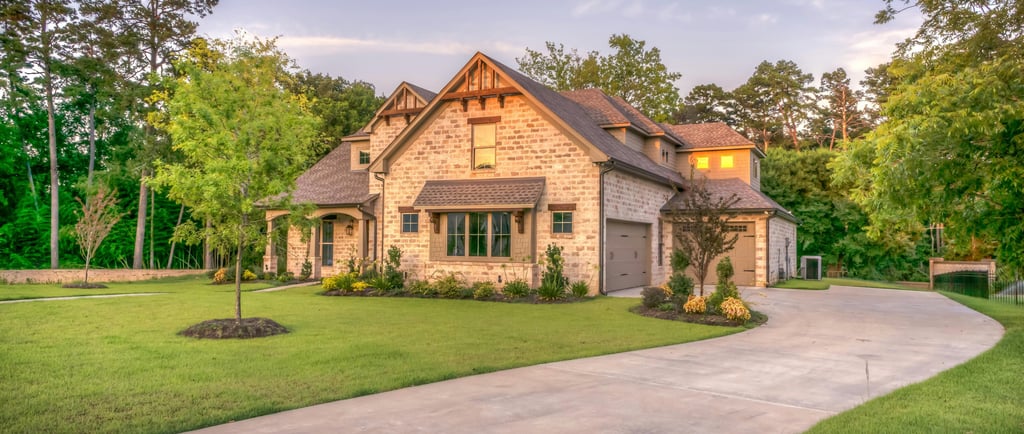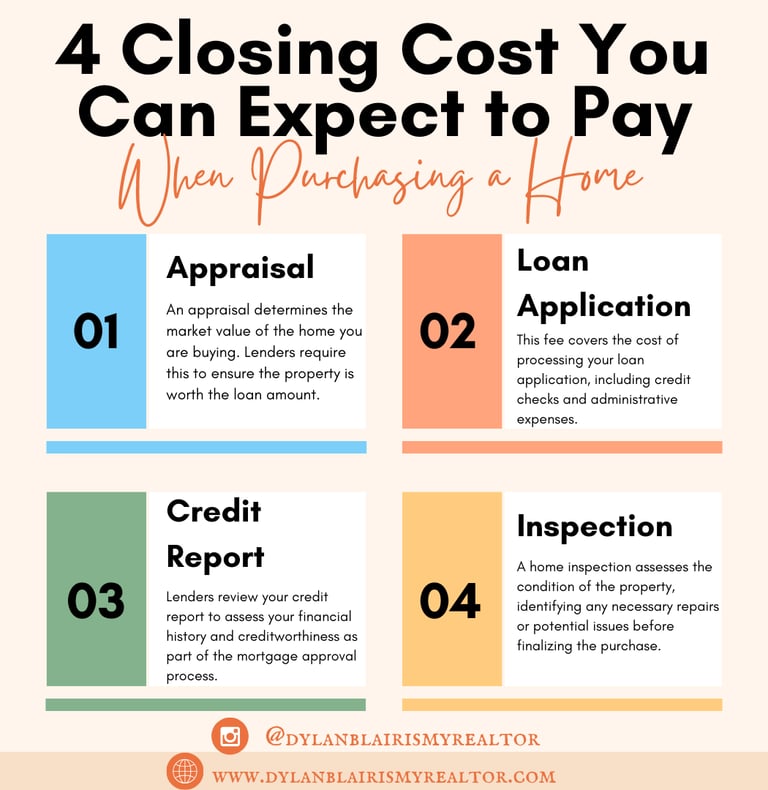4 Closing Costs You Can Expect to Pay When Purchasing a Home
Learn about the key closing costs you can expect when purchasing a home, from appraisal fees to home inspections. Being prepared for these expenses will help you budget effectively and ensure a smoother buying process.
Dylan Blair
9/26/20243 min read


4 Closing Costs You Can Expect to Pay When Purchasing a Home
When purchasing a home, it's easy to focus solely on the purchase price. However, several additional costs, known as closing costs, are essential to keep in mind. These are expenses that buyers must settle before finalizing the deal. Knowing what these costs entail can help you be better prepared, avoid surprises, and budget effectively for your new home.
Here’s a breakdown of four key closing costs that buyers typically encounter:
1. Appraisal Fees
An appraisal is a professional evaluation of the property’s market value. Lenders require an appraisal to ensure the home’s worth matches the loan amount being requested. This protects both the buyer and the lender from overpaying or loaning too much for a property that isn’t worth the asking price.
Why it matters:
The appraisal ensures you're paying a fair price based on the current market value. Without an appraisal, you could end up overpaying for the property, or your lender could offer less financing than you need. The cost of an appraisal typically ranges from $300 to $500, depending on the location and the size of the property.
2. Loan Application Fees
Loan application fees cover the costs associated with processing your mortgage application. This includes credit checks, underwriting, and other administrative costs the lender incurs when handling your loan request.
Why it matters:
Lenders need to thoroughly evaluate your financial background to determine your creditworthiness, which helps them ensure that you're capable of repaying the loan. This fee can range anywhere from $75 to $500, depending on the lender and the complexity of the loan.
3. Credit Report Fees
When applying for a mortgage, your lender will review your credit history to assess your financial stability and risk level. The credit report provides lenders with a detailed history of your financial behavior, including your ability to make payments on time, outstanding debts, and any previous bankruptcies or foreclosures.
Why it matters:
Your credit report plays a significant role in determining whether your mortgage will be approved and what interest rate you will be offered. The cost of pulling a credit report is usually between $25 and $50, but this is a crucial step in determining your mortgage eligibility and rates.
4. Home Inspection Fees
A home inspection assesses the condition of the property and identifies any necessary repairs or issues that may need to be addressed before closing. The inspector will check the structure, electrical systems, plumbing, HVAC, roofing, and more to ensure the home is in good shape.
Why it matters:
A home inspection gives buyers peace of mind by uncovering any potential issues before closing the deal. This helps you avoid unexpected repairs after moving in and allows you to negotiate repairs or credits with the seller. The average home inspection cost ranges from $300 to $500, but the insight it provides can save you thousands in future repairs.


Other Potential Closing Costs
While the four mentioned costs are some of the most common, there are other fees that buyers should be aware of, including:
- Title insurance: Protects against potential ownership disputes.
- Attorney fees: Cover legal representation during the closing process.
- Escrow fees: Fees paid to the escrow company for managing the funds and documents during the transaction.
- Property taxes: May need to be prorated and paid upfront at closing.
How Much Should You Expect to Pay in Total?
On average, closing costs range between 2% and 5% of the home’s purchase price. For example, if you’re purchasing a $300,000 home, closing costs can range between $6,000 and $15,000. While these numbers may seem significant, many of these costs are essential for ensuring a smooth and fair transaction.
Ways to Reduce Closing Costs
There are a few ways to potentially reduce your closing costs:
1. Shop around for lenders: Different lenders may offer various rates and fees. Comparing quotes can save you money.
2. Negotiate with the seller: In some cases, you may be able to negotiate with the seller to cover certain closing costs as part of the deal.
3. Look for closing cost assistance programs: Some states and local governments offer programs to help with closing costs, especially for first-time homebuyers.
Conclusion
Purchasing a home is an exciting milestone, but understanding the various closing costs is crucial for budgeting and avoiding surprises. By being informed and prepared, you can ensure a smoother, less stressful home-buying process. From appraisals to inspections, each of these costs plays a vital role in securing your dream home and protecting your investment.
If you're ready to start the home-buying journey or have questions about closing costs, don't hesitate to reach out to me for expert advice and guidance!
Contact Me for More Information:
📧 dylanblair@kw.com
🌐 www.dylanblairismyrealtor.com